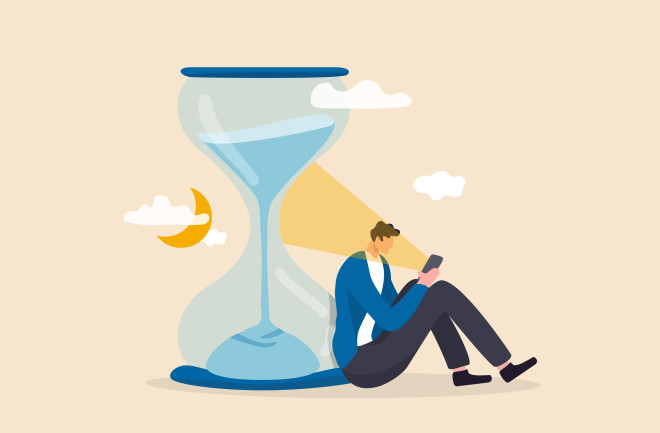Leaving aside the fun and fascinating question about whether time exists — even if we assume that time is a real entity — our own personal perceptions of the flow of time can slow, stretch, speed up, and everything in between.
Our brains constantly monitor a complex influx of signals arriving with different timings, and the balancing act from all those signals, combined with many internal operations, combine to give us our sense of time’s passage. These systems work…well, most of the time.
How Our Brains Sense Time
To get a taste of just how much work our brains do to give us a steady experience of time, consider watching a movie. Neither the video nor the sound from the movie arrive at our eyes and ears in a continuous steam. Instead, the video is composed of a series of still images, usually 24 every second. Our brains seamlessly blend these images together to give us the perception of continuous motion.
On the other hand, the sound is usually sampled several tens of thousands per second, because our brains can perceive and respond to sound much faster. Any less than that and we would notice discernable gaps in the audio.
So not only are our brains receiving two very different kinds of inputs at totally different rates, we somehow manage to combine all these audio samples and still images into a continuous stream, and blend them together to match up the visual and audio information – letting us enjoy the movie.
Experiments have even shown that the audio and video can be out of sync by up to roughly a tenth of a second and our brains will still match everything together.
Our brains do that all the time (pun intended), plus all the sensory information like touch, smell, taste, motor control, balance, hormones, and everything else, which all send and receive information at different rates. It seems that our brains have numerous internal “clocks” consisting of various biological mechanisms that all repeat at their own intervals, allowing the brain to keep track of some processes at the level of milliseconds and others at the scale of decades.
Read More: What Is Time?
The Stopped Clock Illusion
It’s no wonder then that sometimes our sense of the flow of time can go off kilter. For example, we tend to pay more attention to new events or information than repeated ones. One way to see this for yourself is called the “stopped clock" illusion. When you first glance at a clock, the second hand seems to pause before continuing its regular movement because your brain is overestimating how long the second hand is in that position.
Many have reported – and you may have personally experienced – the sensation of time slowing down or even stopping during moments of awe or fear. It seems as if you can have a series of long, complicated thoughts all in the blink of an eye.
We’re not sure if this is a real effect, perhaps triggered by an increase in neural activity that allows our conscious minds to receive and process more information than usual, or if it’s just an exaggeration of our memories due to the strong emotional content of the moment.
Read More: Will Time Ever Stop: Could There Be an End to the Future?
Time Is Personal and Difficult to Study
This shows just how difficult it is to study our perceptions of time; since they’re all personal to us, and nobody can sense another person’s flow of time from the outside.
Even with that difficulty, scientists have learned of many situations that can distort our sense of time, and what areas of the brain might be causing those distortions.
For example, people suffering from Parkinson’s disease have difficulty maintaining regular rhythms, such as tapping a finger at a fixed interval. People with ADHD often have trouble telling the difference between two lengths of time. Various drugs can interfere with the brain’s ability to accurately assess the duration of events, maintain rhythms, and more.
Tied to all of this is our relationship with our memory, which forms a core part of our self-identity and our larger sense of the passage of time across our lives. Various regions of the brain, like the prefrontal cortex, leverage our working memory to tell us how long it’s been since an event. Other areas of the brain, like the parietal cortex and supplementary motor area, help us make predictions of timing based on past experiences.
We have no universal answer as to how our brains process the flow of time. Whatever it is, it appears to be a deep biological function, since even invertebrates have some basic perceptions of time.
So don’t be surprised the next time you and a friend disagree about how long the dinner was, or if you feel like sometimes the meeting will simply never end. In the words of the time-traveling Dr. Who, time is “…more like a big ball of wibbly-wobbly, timey-wimey... stuff.”
Read More: What Did Einstein's Theories Say About the Illusion of Time?
Article Sources
Our writers at Discovermagazine.com use peer-reviewed studies and high-quality sources for our articles, and our editors review for scientific accuracy and editorial standards. Review the sources used below for this article:
National Library of Medicine. Major Structures and Functions of the Brain.
PubMed Central. Consistent chronostasis effects across saccade categories imply a subcortical efferent trigger.
National Library of Medicine. Neuroanatomy, Prefrontal Cortex.
Paul M. Sutter is a theoretical cosmologist, NASA advisor, host of the "Ask a Spaceman" podcast, and a U.S. Cultural Ambassador. He is the author of "Your Place in the Universe" and "How to Die in Space."

